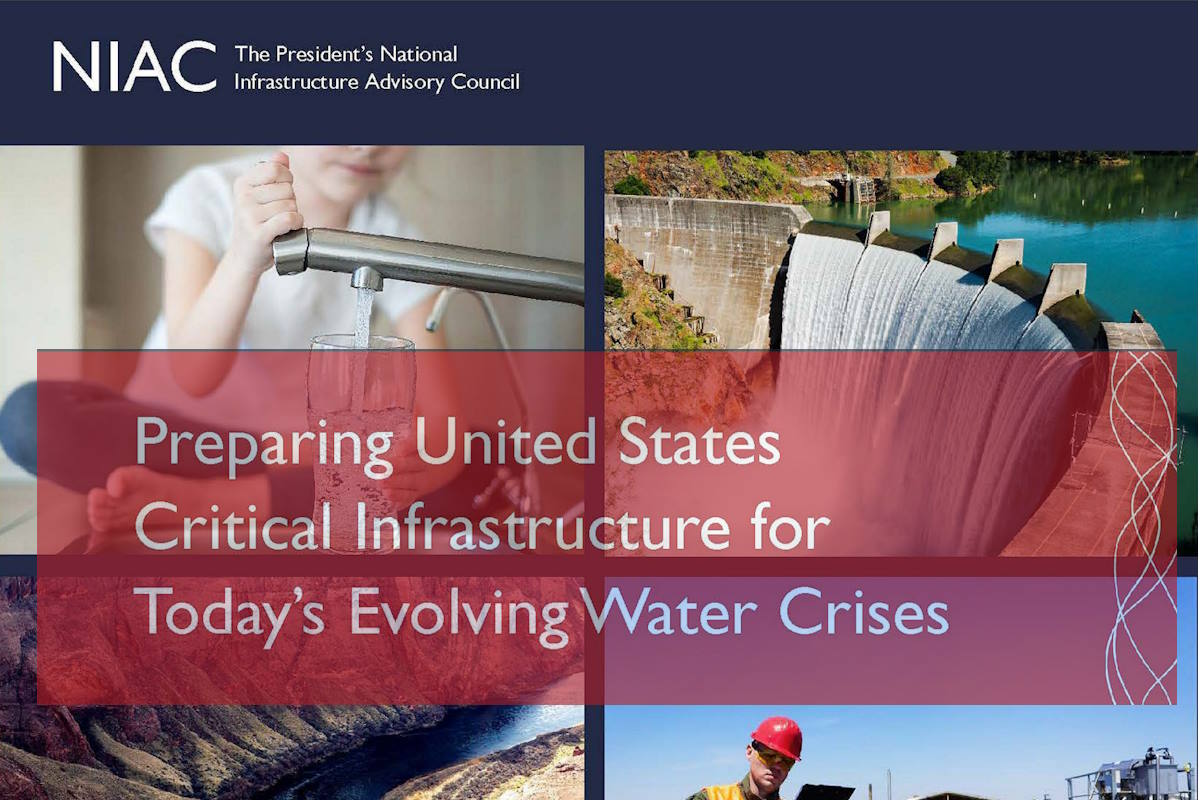NIAC reports cybersecurity compromises in water sector will require a more specialized workforce

Water utilities face challenges in recruiting, training, and retaining their workers, the U.S. President’s National Infrastructure Advisory Council (NIAC) disclosed in its latest report published Monday. The agency added that about one-third of the current water sector workforce will be eligible to retire in the next ten years. Technologies used in the water sector are becoming more advanced. New water quality regulations such as the limits on forever chemicals and threats such as cybersecurity compromises will require a more specialized workforce.
“Workforce development will require upskilling and reskilling current employees, enabling re-entry of retirees, and ensuring skill enhancement is equitable,” according to the report titled ‘Preparing United States Critical Infrastructure for Today’s Evolving Water Crises.’ “Attracting individuals from disadvantaged communities to a career in water will be key to creating the water utility workforce of the future. Women are particularly underrepresented in the water sector workforce. Most young people, including women, do not view the water sector as an attractive career path, but, increasingly, young people want to make the world a better place.”
The NIAC report also added that employment in the water sector can be made more appealing by promoting that work in this sector can ensure that all Americans have access to safe, sufficient water. “Smart system monitoring technologies, advances in treatment processes, and new processes and information system management will provide many opportunities for people entering the workforce to have successful, fulfilling, and exciting careers.”
Furthermore, it added that the industry must reach out and promote these new exciting career opportunities. “Overcoming the reputation of being a stodgy, low-tech, male workforce is one issue, another is that the future water sector workforce requires commensurate compensation with increased skill sets.”
The NIAC’s 2023 Cross-Sector Collaboration to Protect Critical Infrastructure report noted in March that the ability to attract information technology (IT) talent varies significantly between industries. Specifically, it is easier for industries where IT is part of their core business to attract highly skilled talent compared to industries where it is a necessary component but not the core function of the business.
The latest report identified that without additional investment in technologies routinely employed in other infrastructure and employees, water utilities will be hard-pressed to find the skilled employees needed to meet their cybersecurity needs. Additionally, utilities must protect customer data and maintain secure control of all processes within their systems. This problem is exacerbated by the public sector, which must compete for talent with the private sector.
In its list of recommendations to aid infrastructure owners and operators, the NIAC called upon the water sector to ensure that protocols and processes are in place to face natural and man-made disasters and disruptions in water supply. It laid down creating and implementing a water industry national standard in cybersecurity that is affordable and attainable by all utilities. It also suggests investing in cybersecurity systems at water plants and on military bases and facilitating connectivity of adjacent water systems for water sharing during emergencies.
At this point, the report flagged the March 2023 lawsuit initiated by certain states against the U.S. Environmental Protection Agency’s (EPA) ruling that requires water authority to upgrade their cybersecurity system is the type of disagreement that needs to be settled out of court and further supports the NIAC’s recommendation for a comprehensive water strategy and a Department of Water. The main objection made by those states was that it would be too costly to suppliers who will then need to pass on the cost to consumers. In addition, their objection was a lack of staffing, training, and expertise to evaluate cybersecurity programs. These are precisely the issues the NIAC aims to address in its recommendation.
The NIAC report recommends creating a national water strategy that elevates the importance of water in the national consciousness through a public awareness program, and an institute either a Department of Water or some other entity that stewards water at the Cabinet level.
According to the NIAC document, the proposal suggests the creation of a Department of Water (DOW) to collaborate with state, local, tribal, and territorial governments, as well as stakeholders, to ensure America’s economic prosperity, security, and quality of life. The move will also deliver safe, efficient, sustainable, and equitable water, wastewater, and stormwater systems responsive to changing climate, hazards, and threats, including physical and cyber threats.
The DOW would be charged with creating and implementing a near-term and long-term national strategic plan for water infrastructure. It must also develop national policies and standards that would ensure adequate and sustainable water supply through conservation, aquifer replenishment, cross-regional cooperation, and water storage. It will also partner with states, regions, and neighboring nations to develop standards for water use that would promote resiliency and balance between supply and demand.
The NIAC also prescribed that the DOW must work with the U.S. administration and Congress to develop policies and laws that would resolve water governance issues, including water rights disputes and water allocations. It must further develop budget requirements, and establish national priorities for funding and implementation consistent with the national water strategy. It also called for establishing priorities and associated budget requirements necessary to increase the resilience of the water system to physical and cyber threats.
The report also laid down that the DOW must work with public water system owners to identify necessary infrastructure upgrades and determine funding plans that include local investments, national subsidies, and water rate increases, when necessary. It will also institute policies and budgets necessary to ensure equitable access to water, wastewater, and the benefits of stormwater, and collaborate with related agencies and programs to ensure cross-government alignment.
The NIAC document also recommends that the DOW develop a public affairs strategy to promote public awareness and commitment to water management, including educating the public about their role in water conservation. It will also suggest funding to stakeholders in watershed modeling to support public actions and investments; and developing and funding a world-class research and development (R&D) program in water supply and resilience that would include new approaches to water access (desalinization), automated management schemes, new approaches to PFAS elimination, cyber security, and/or new uses of artificial intelligence, etc.
Last month, a U.S. Court of Appeals for the Eighth Circuit granted a request from the American Water Works Association (AWWA) and the National Rural Water Association (NRWA) to stop the EPA Cybersecurity Rule from going into effect until the current case challenging the rule has been decided. The move applies to all AWWA and NRWA members nationwide and comes as the public wasn’t allowed to comment on EPA’s proposed approach before the rule was issued. By granting a stay, the court has prevented these risks to members while it reviews the legality of EPA’s rulemaking process.










